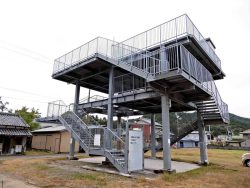11:45 JST, August 17, 2023
NEW DELHI (Thomson Reuters Foundation) — Like many transgender Indians, 32-year-old social worker Leela thinks twice before using a public toilet. After facing insults and hostility in the past, she often opts to put up with the discomfort until she gets home.
“Using a public toilet is perhaps the easiest thing for a non-LGBTQ person. But for a trans woman like me, it can be … a traumatic experience,” Leela told the Thomson Reuters Foundation in New Delhi, asking to use only her first name.
She recalled an incident several years ago when she was forced to leave a women’s toilet after other women objected to her presence.
“Since then I realized that I have no other option but to hold my pee,” she said.
Repeatedly holding urine for long periods of time can cause abdominal pain and increase the risk of urinary infections.
“It’s really inhuman,” said Fred Rogers, an LGBTQ+ activist from the southern state of Tamil Nadu who filed a petition to the Madras High Court earlier this year demanding at least one gender-neutral bathroom in all public spaces.
His is one of several such initiatives focused on boosting trans bathroom access across the country of 1.4 billion people, where awareness of transgender rights issues is slowly growing.
India’s Supreme Court ruled in 2014 that trans people should be recognized as the “third gender,” extending rights that allow them to self-identify as their chosen gender, but prejudice and social marginalization persist.
Many are rejected by their families and denied jobs, education and healthcare, driving many trans women — also known in India as hijras — to survive through begging at busy intersections and on trains, performing at social functions such as weddings, or selling sex.
Under the Transgender Persons (Protection of Rights) Act, trans people should have equal access to public services and not face discrimination, but the bathroom issue shows that is often not the case in practice, said Rogers.
Bathroom bills
Access to public toilets has become a flashpoint as fierce debate about trans rights takes place around the world, particularly in the United States.
Following other states, Florida Gov. Ron DeSantis signed into law a so-called “bathroom bill” earlier this year requiring all restrooms or locker rooms at public facilities to be used exclusively for people based on their gender assigned at birth.
LGBTQ+ rights campaigners say trans people should be able to access single-sex spaces according to their gender identity — from swimming pool changing rooms to hospital wards.
Most public hospitals in India, for example, do not have specific wards for trans people, or do not allow them to be accommodated in wards of the gender with which they identify.
But the bathroom issue is compounded in India by the lack of bathroom facilities in homes, many of which do not have their own toilet — especially in poorer neighborhoods or the slums. That means shared facilities are the only option for many.
In the eastern state of Assam, local LGBTQ+ group Drishti has launched a campaign called #NoMoreHoldingMyPee to highlight the problems faced by trans and non-binary people, who identify as neither male nor female.
“Being able to answer nature’s call is basic. Though there are facilities available for men and women, a trans person can feel threatened if they try to access them,” said Rituparna, a member of the group who goes by one name.
Like the Tamil Nadu campaigners, the group is calling for gender-neutral toilets that can be used by anyone regardless of their sex or gender identity.
Small step
Five years since India legalized same-sex relations, there are signs of change on the issue, LGBTQ+ campaigners say.
In March, Delhi’s High Court ordered the city government to build public toilets for trans people within eight weeks, following a successful petition from LGBTQ+ rights groups.
Delhi authorities said in response that about 500 toilets initially meant for people with disabilities had been designated for the use of trans people, adding that the creation of separate bathrooms for the third gender was now a priority.
Other public institutions such as universities are also starting to take note.
Vaivab Das, a research scholar at the Indian Institute of Technology (IIT) in New Delhi, who is non-binary, was behind the introduction of gender-inclusive restrooms at the college, which now has 12 such facilities.
More than 20 IIT campuses across the country have followed suit, Das said.
“Trans persons have been historically removed from public spaces and denied opportunities to access education, employment and other rights,” Das added.
“Making [toilets] accessible to gender minorities is a small step toward making amends for historical and systematic exclusions.”
"World" POPULAR ARTICLE
-

8 Japanese Nationals Stranded on Indonesia’s Sumatra Island
-

U.S. Senate Resolution Backs Japan, Condemns China’s Pressure
-

Mozambican Cooking Class Held in Matsuyama, Ehime Pref.; Participants Don Aprons, Bandanas Made from Traditional Mozambique Fabric
-

China to Impose Sanctions on Shigeru Iwasaki, Former Head of Japan’s Self-Defense Forces, Who Serves as Adviser to Taiwan’s Executive Branch
-

South Korea’s Top Court Dismisses Nippon Steel Appeal in Lawsuit over Requisitioned Worker
JN ACCESS RANKING
-

Tokyo Economic Security Forum to Hold Inaugural Meeting Amid Tense Global Environment
-

Keidanren Chairman Yoshinobu Tsutsui Visits Kashiwazaki-Kariwa Nuclear Power Plant; Inspects New Emergency Safety System
-

Imports of Rare Earths from China Facing Delays, May Be Caused by Deterioration of Japan-China Relations
-

University of Tokyo Professor Discusses Japanese Economic Security in Interview Ahead of Forum
-

Japan Pulls out of Vietnam Nuclear Project, Complicating Hanoi’s Power Plans






















